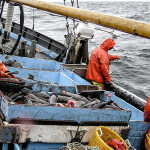Seafood giant Thai Union and environmental groups including OceanMind and the Environmental Justice Foundation (EJF) are praising the European Commission’s decision to lift the yellow card warning it placed on Thailand’s seafood industry in 2015.
EJF Director Steve Trent, who predicted the removal of the yellow card as early as December 2016, said Thailand has made “significant and substantial improvements” to its monitoring, surveillance, and enforcement capabilities.
“On-the-ground investigations have shown good progress, including innovative efforts such as the use of covert patrol vessels to combat non-compliance among vessel operators and intercept illegal fishing boats,” Trent said in a press release. “In addition, Thailand has shown vitally important regional leadership in moving to become the first country in Asia to ratify the Work in Fishing Convention C188, which sets basic standards of decent work in the fishing industry. This bold step is to be applauded and we note it is vital that ratification of the convention proceeds as planned at the end of January.”
EJF has worked in Thailand since 2013 and has in recent years collaborated with the Thai government to improve the operations and processes of the country’s Department of Fisheries, Command Centre for Combatting Illegal Fishing, Ministry of Labor, Department of Labor Protection and Welfare, and Marine Department.
OceanMind’s Chief fisheries analyst Bradley Soule said, “Thailand is thoroughly deserving of this decision. Their determination to enact and enforce fisheries laws has reduced the incidence of illegal fishing by Thai vessels, as well as reduced the likelihood of IUU seafood product being landed or processed in Thailand.”
OceanMind, a non-profit organization with the mission of increasing the sustainability of fishing globally, has also worked with the Royal Thai Government Department of Fisheries for the last three years, providing training and supporting improvements in its monitoring and analysis. The group and its Seafood Task Force praised Thailand’s implementation of the Port State Measures Agreement, saying in a press release that the country had “gone above and beyond the requirements for this agreement with an inspection and traceability regime that makes it a global leader.”
Thailand has also made other improvements, such as better enforcement of fisheries laws, reducing the number of licensed vessels, enacting closed areas where fishing is prohibited, and requiring all larger vessels to be properly monitored, OceanMind Chief Fisheries Analyst Bradley Soule said.
“Thailand is thoroughly deserving of this decision,” Soule said. “Their determination to enact and enforce fisheries laws has reduced the incidence of illegal fishing by Thai vessels, as well as reduced the likelihood of IUU seafood product being landed or processed in Thailand.”
However, both EJF and OceanMind said Thailand must continue to make improvements.
“Although there has been significant progress, important gaps remain,” EJF said. “EJF has … found lingering shortcomings that prevent Thailand’s fishing industry from becoming truly ethical and sustainable.”
Trent named addressing the overcapacity of the Thai fishing fleet and further building up the “Port in Port out” (PIPO) network – to which all fishing vessels above 30 gross tons must report before and after every fishing trip – as top priorities for future efforts.
“Without the threat of sanctions from the EU, strong political will is needed to entrench the positive progress already made and ensure its long-term success,” the EJF said. “This would help establish the country as a regional and international leader in ethical seafood production. EJF remains committed to working closely with the Royal Thai Government to bring about these reforms and preserve existing reforms as quickly and as thoroughly as possible.”
In its own statement, Thai Union, which operates seafood brands including John West, Petit Navire, Parmentier, Hawesta, Lysell and Mareblu, with total annual sales exceeding THB 135 billion (USD 4 billion, EUR 3.5 billion), said the yellow carding process created an opportunity for Thailand to lead the way in fisheries reform in the region.
Thai Union CEO Thiraphong Chansiri praised the work the Thai government has done to make the improvements requested by European authorities, and said he was proud his company had played a role in promoting positive changes in the Thai fishing industry. Chansiri said the country’s efforts will help in promoting seafood trade to the European Union from Thailand.
"I want to congratulate the Royal Thai Government for its efforts to bring change to the country in the fight against illegal, unreported and unregulated (IUU) fishing," Chansiri said. "The improvements to regulation and enforcement of the fishing industry have been significant, not only in terms of traceability and the sustainable development of the fisheries but also in terms of eliminating human rights violations."
Darian McBain, global director of sustainable development at Thai Union, pointed to Thailand’s improvements to the payments system used to remunerate migrant workers as a major step forward for human rights and the safeguarding of workers in the fleet. She also applauded Thailand’s involvement with the Bali Process on People Smuggling, Trafficking in Persons and Related Transnational Crime.
"Thailand's involvement in the Bali Process should be applauded as well," said McBain. "It provides a platform for governments to engage the private sector on how to best combat human trafficking, forced labor and related exploitation."
Seafood is one of Thailand’s largest industrial sectors, with exports totaling 1.4 million metric tons, valued at USD 5.8 billion (EUR 5 billion) in 2016.
Photo courtesy of Thai Union






